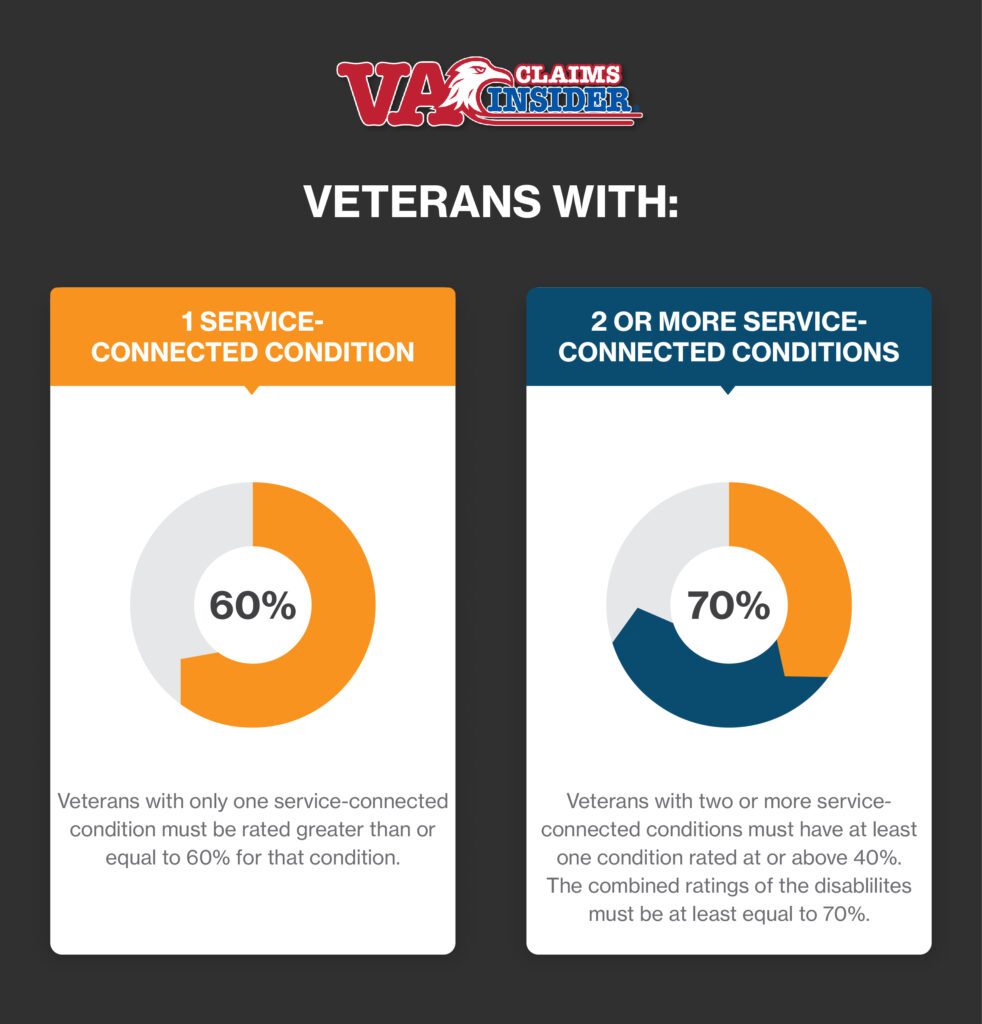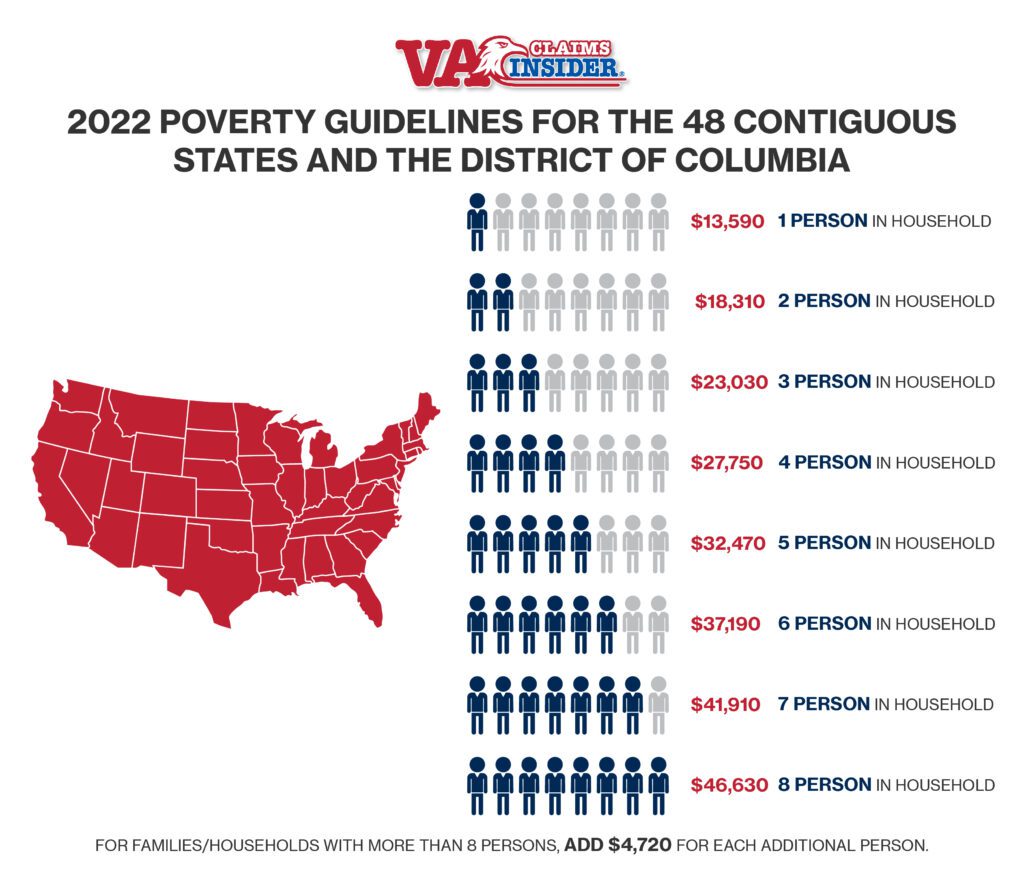Looking for Expert-Level VA Claim Answers?📱Call Us Now! 737-295-2226
This post explains TDIU and breaks down TDIU vs. 100 percent disability. We also cover how to file a TDIU claim.
Does your service-connected condition prevent you from working? Thanks to Total Disability Individual Unemployability (TDIU), veterans who are unable to work (or unable to sustain “substantially gainful employment”) with VA ratings below 100 percent can still be paid benefits at the 100 percent level.
There are three ways you can be paid at the 100 percent level by the VA:
- TDIU
- 100 percent schedular (your disability ratings combine to a rating of 95 percent, which rounds to 100 percent)
- 100 percent Permanent and Total
TDIU benefits are paid to hundreds of thousands of veterans! As of 2020, over 258,000 veterans receive benefits at the 100 percent disability level. Half of these 258,000 veterans are not rated at the 100 percent schedular level, but are receiving TDIU benefits.
Keep reading to learn about the differences between TDIU veteran benefits and 100 percent disability claims!

- TDIU vs. 100 percent Disability
- Schedular vs. extra-schedular TDIU
- VA Requirements for Extra-Schedular TDIU
- Substantially gainful employment: can I work with TDIU?
- When I file a VA disability claim, am I automatically considered for TDIU benefits?
- How to file for TDIU vs. 100 percent disability
- Can TDIU be permanent and total?
- Can TDIU be taken away?
- Which is better—a TDIU or 100 percent schedular rating?
- NEED MORE ASSISTANCE?
- About the Author
You DESERVE a HIGHER VA rating.
Take advantage of a VA Claim Discovery Call with an experienced Team Member. Learn what you’ve been missing so you can FINALLY get the disability rating and compensation you’ve earned for your service.
TDIU vs. 100 percent Disability
Both TDIU and 100 percent disability benefits compensate veterans with the same monthly compensation. (In 2022, that’s $3,332.06 per month for a veteran living alone.) TDIU benefits compensate you at the 100 percent level even if your disabilities don’t combine to a 100 percent VA rating.
It’s typically much easier for veterans to be approved for TDIU than to earn a 100 percent schedular rating from the VA.
Achieving a 100 percent disability rating is usually more difficult because the VA’s Schedule for Rating Disabilities criteria is specific to the severity of your symptoms. According to the VA’s standards, you could have a disability that prevents you from working but still not have symptoms that qualify you for a 100 percent rating.
For instance, the average rating for PTSD is 70 percent. To receive a 70 percent schedular rating for PTSD, you must have “deficiencies in most areas” regarding work, school, family relations, judgment, thinking, or mood.
A 100 percent PTSD rating requires the veteran to have total occupational and social impairment instead of just deficiencies in most areas.
A veteran with a 70 percent PTSD rating with deficiencies in most of those areas could very well have difficulty working, which is why the VA compensates eligible veterans with TDIU.
If you’re unable to work (or sustain “substantially gainful employment”) based on your service-connected condition or conditions, you may be eligible for TDIU, depending on your VA disability rating. Below we cover specific TDIU ratings.

Schedular vs. extra-schedular TDIU
When referring to TDIU, most people mean schedular TDIU. Under this method, the VA assigns you a TDIU rating based on your inability to work or maintain employment above the federal poverty threshold (“substantially gainful employment”). You must have a VA disability rating that meets the VA’s threshold (more on this below).
Extra-schedular TDIU is a catch-all that allows the VA to compensate you at the 100 percent level even if you don’t meet the schedular requirements.
Some veterans use the abbreviation Individual Unemployability (IU) when talking about TDIU. There is no difference between IU and TDIU; they’re the same thing.
The VA requirements for schedular TDIU
To receive benefits for schedular TDIU, you must meet two different requirements, one for your rating and one based on your ability to work:
- You must have a specific service-connected VA disability rating; either:
- You’re rated at 60 percent or more for one condition, or
- You have a combined rating of 70 percent or more between two conditions, with one of the conditions rated at 40 percent or higher, and
- You’re unable to hold a job that supports you financially through substantially gainful employment
If you have multiple conditions that don’t meet the 60 percent or 40 percent “one condition” requirement, you could still qualify for schedular TDIU. The VA will combine multiple conditions into “one condition” for the purposes of TDIU if they meet any of these requirements:
- Disabilities of one or both arms or legs
- Disabilities resulting from common etiology (cause) or a single accident
- Disabilities affect a single body system
- Examples include disabilities impacting orthopedic, digestive, respiratory, cardiovascular-renal, or the neuropsychiatric system
- Multiple injuries incurred in action
- Multiple disabilities incurred as a POW
Examples of veterans who could pursue TDIU vs. 100% disability
Example 1: Rated 70 percent for PTSD
If you’re rated 70 percent for PTSD, you meet the criteria of one disability rated 60 percent or higher. You’ll be approved for TDIU if you can’t hold gainful employment.
Example 2: Rated 30 percent for right knee, 30 percent for right ankle, 20 percent for the right foot, 30 percent for asthma (all service-connected)
The knee, ankle, and foot ratings combine to give you a 61 percent “one condition” rating which meets the requirement that one condition is rated at 40 percent or higher. Your combined rating example, you’ll be approved for TDIU if you can’t hold gainful employment.
We cover the VA’s definition of substantially gainful employment later in this article. But first, in case you don’t meet the above rating requirements, let’s explain extra-schedular TDIU.
VA Requirements for Extra-Schedular TDIU
If you don’t qualify for schedular TDIU based on your VA rating, you could still be eligible for TDIU under a catch-all provision: extra-schedular TDIU.
Extra-schedular TDIU is designed to compensate you at the 100 percent level even when you aren’t rated at the minimum rating requirements (60 percent for one disability or 70 percent for two or more disabilities with one rated at least 40 percent.)
In other words, this type of rating is designed to allow you this rating when the standard VA disability rating schedule doesn’t capture the degree to which your disability impacts your ability to function, work, and live a normal life.
Extra-schedular TDIU is harder to qualify for. You must prove that your service-connected disability prevents you from holding a job that supports you above federal poverty levels, even though your rating doesn’t meet the minimums above.
Regardless of what type of TDIU you’re seeking, the critical piece is that you’re unable to maintain “substantially gainful employment” with earnings above the federal poverty level. Below we cover when and how much you can work and still be eligible for TDIU.
Substantially gainful employment: can I work with TDIU?
Yes, you can work with TDIU, but there are limitations.
There are two categories veterans fall into when it comes to employment: substantially gainful employment and marginal employment.
TDIU Income Limits
Veterans must be earning more than a specific income level to be considered substantially gainfully employed. If you’re substantially gainfully employed, you won’t automatically qualify for TDIU.
The VA links substantially gained employment to the federal poverty guidelines. For 2022, the poverty threshold is $13,590 for a veteran with no dependents. This increases by $4,720 for each dependent. So, if you make $13,590 annually or more (as a veteran with no dependents), you’ll typically be considered substantially gainfully employed.
Anything less than $13,590 annually is considered marginal employment and qualifies you for TDIU. Read our post on TDIU income limits to learn more.

PRO TIP: Many veterans believe that receiving TDIU means they cannot work at all. This isn’t true. It’s important to note that you can still perform limited paid work while still receiving TDIU. The question is not whether you’re working but whether your income meets poverty guidelines.
Do you work in a protected environment? TDIU income limits may be waived
You can earn over $13,590 annually and still qualify for TDIU if you work in a protected work environment.
If an employer makes special accommodations for your disability that enable you to keep working and earning above the poverty threshold, the VA classifies this as employment in a protected work environment.
The VA doesn’t have a defined policy on which special accommodations qualify a job as a protected work environment.
Examples of special accommodations might include being paid the same amount for less work or productivity than other employees or being excused from mandatory training. Veterans who work in a family business often qualify for TDIU if they’re given time off due to their disability but are still paid the same.
If you apply for TDIU, the VA will make a judgment about whether or not your job is in a protected environment based on the facts of your case.
Including a statement from your employer detailing your special accommodations and relating those to your disability will help demonstrate to the VA that you work in a protected environment.

When I file a VA disability claim, am I automatically considered for TDIU benefits?
When you file a VA claim, the VA is supposed to automatically determine if you qualify for TDIU benefits. This doesn’t always happen, however, which is why self-advocating is so important to receive the compensation you deserve!
There are a few steps the VA takes when looking at your claim. The first step is to determine if you meet the schedular requirements for TDIU. (Again, that would mean you have a disability rated at least at 60 percent or two that combine to at least 70 percent—with one of those disabilities rated at least 40 percent).
If you do meet those requirements, your VA regional office should move to step 2—employment consideration. This is where your case for being unable to maintain substantially gainful employment would come in.
Technically, the VA should consider whether TDIU is applicable based on your claim and the records provided. But you can also apply for TDIU directly if you think you’re eligible and the VA has not considered TDIU in your case.
How to file for TDIU vs. 100 percent disability
To file for TDIU benefits, you’ll need to submit a regular disability claim along with a few extra forms.
To file for the most common type of TDIU benefits (schedular), you must meet the minimum service-connected rating requirements and fill out VA Form 21-8940. This form asks about:
- The service-connected disabilities that prevent you from working
- Any hospitalization information in the last 12 months
- Your work history from the last five years (including when your disability affected full-time employment and you became too disabled to work)
- Names and addresses of employers
- Types of work
- Hours worked per week
- Time lost from illness
- Highest gross earnings per month
- Total income from the past 12 months
- Whether or not you’ve tried to obtain employment since you became too disabled to work
- Schooling and other training
- Personal statement/remarks about your case
In addition, recent employers must complete VA Form 21-4192. This form includes:
- Employment information (dates, hours worked, and amount earned)
- Time lost during work due to your disability
- Concessions made to you by your employer due to your disability
- Reason for your termination with the employer
- Duty status if you’re in the Reserve or National Guard
- Any entitlements or other benefits you’re receiving
- Your employer’s remarks
If you don’t meet the rating minimums and therefore are pursuing extra-schedular TDIU, the process is slightly different. You must submit the following documents to the Director of Compensation Service:
- A complete statement of your service-connected disabilities
- Your employment history
- Educational and vocational attainment
- Any other factors that impact the issue
For more information about how to file a winning claim, read our post on filing a VA TDIU claim.
Can TDIU be permanent and total?
TDIU benefits are not necessarily permanent, but they can be granted permanent status. Generally, TDIU benefits are intended to provide veterans with enough income to live on when they can’t maintain substantially gainful employment due to their service-connected disabilities.
If you believe your circumstances warrant it, you’ll need to apply for permanent status and prove to the VA that your service-connected condition(s) are unlikely to improve over time, making you permanently unemployable above the federal poverty level.
If your level of disability changes such that you can start earning income above the federal poverty limits, your TDIU benefits will be revoked.
In the past, if you were a veteran receiving TDIU benefits, you had to submit a questionnaire to the VA every year to determine if you still qualified. This process changed in 2019. The VA now uses Social Security Administration (SSA) data to determine which veterans pay into Social Security. The VA may request you fill out VA Form 21-4140 Employment Questionnaire based on this data.
TDIU benefits can also be granted temporarily for a few different reasons, including:
- Prestabilization: recently medically discharged veterans where employment isn’t feasible or advisable
- Extended hospitalization: hospitalizations lasting 21 days or longer due to service-connected disabilities
- Recovery from surgery due to service-connected disabilities where recovery lasts one or more months
Can TDIU be taken away?
In order to retract your TDIU rating, the VA must prove with clear and convincing evidence that you’re now more than marginally employable (above the federal poverty level).

Which is better—a TDIU or 100 percent schedular rating?
There is no correct answer as to whether TDIU vs. 100 percent disability is “better.” The answer depends on your situation.
A TDIU rating could be your best option if:
- You’re a veteran who can’t work or maintain substantially gainful employment due to one or more service-connected disabilities, but you also don’t qualify for a 100 percent schedular rating based on your symptoms, or
- You’re having difficulty getting the VA to rate you at the 100 percent disability rating level
On the other hand, to keep your TDIU rating, you can’t earn more than $13,590 annually through employment (if you’re a veteran with no dependents) unless you’re working in a protected environment. There are no limitations on your ability to work if you have a 100 percent schedular VA rating.
NEED MORE ASSISTANCE?
Most veterans are underrated for their disabilities and therefore not getting the compensation they’re due. At VA Claims Insider, we help you understand and take control of the claims process, so you can get the TDIU rating and compensation you’re owed by law.
Our process takes the guesswork out of filing a VA disability claim and supports you every step of the way in building a fully-developed claim (FDC)—so you can increase your rating fast!
If you’ve filed your VA disability claim and have been denied or have received a low rating—or you’re unsure how to get started—reach out to us! Take advantage of a FREE VA Claim Discovery Call. Learn what you’ve been missing—so you can FINALLY get the disability rating and compensation you deserve!
We’ve supported more than 25,000 veterans to win their claims and increase their ratings. NOW IT’S YOUR TURN.
About the Author

Brian Reese
Brian Reese is a world-renowned VA disability benefits expert and the #1 bestselling author of VA Claim Secrets and You Deserve It. Motivated by his own frustration with the VA claim process, Brian founded VA Claims Insider to help disabled veterans secure their VA disability compensation faster, regardless of their past struggles with the VA. Since 2013, he has positively impacted the lives of over 10 million military, veterans, and their families.
A former active-duty Air Force officer, Brian has extensive experience leading diverse teams in challenging international environments, including a combat tour in Afghanistan in 2011 supporting Operation ENDURING FREEDOM.
Brian is a Distinguished Graduate of Management from the United States Air Force Academy and earned his MBA from Oklahoma State University’s Spears School of Business, where he was a National Honor Scholar, ranking in the top 1% of his class.




